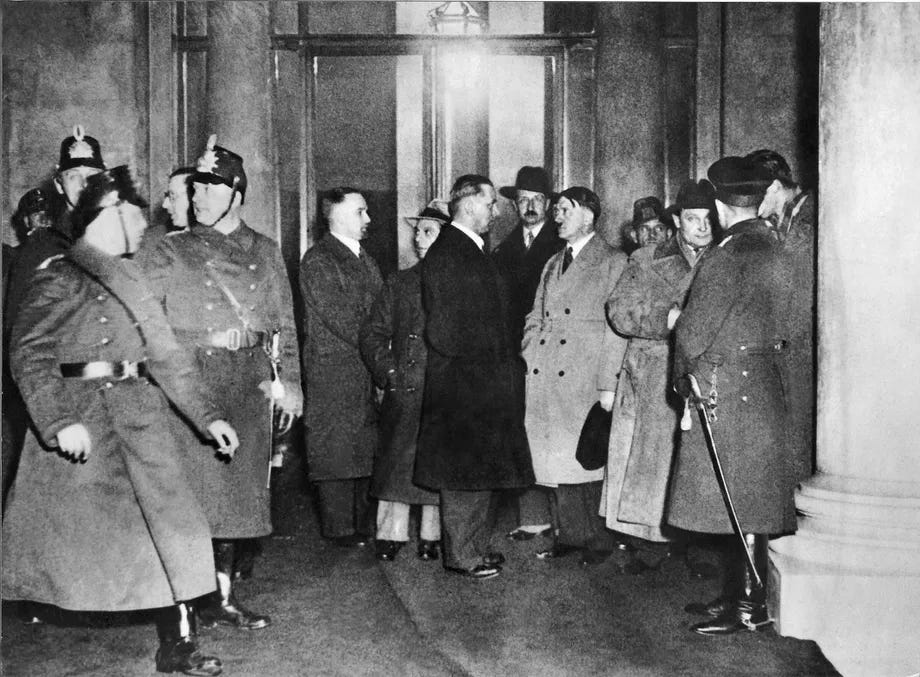
Adolf never had much time for planet sensible. Here he is after the Reichstag fire with fellow traveller Sefton Delmer who was Berlin correspondent for the “Daily Express” from 1928 to 1933, To the left of Hitler: August Wilhelm of Prussia. In the middle of the picture, half hidden with a hat: Joseph Goebbels. Third from the right: Hermann Göring..Check out other fascinating pics and details here.
On planet sensible everyone is ‘rational’. (Quick, let’s not dwell on what ‘rational’ means or we could be here all day!) People seek to discover and pursue what’s in their own interests. Bertrand Russell I think during his time as a conscientious objector to WWI said to Maynard Keynes that he really couldn’t take economics seriously. As he watched people gleefully march off to the slaughter of the trenches in their millions, he couldn’t take seriously a discipline that was built on the axiom that people act in their own interest.
And on planet sensible, purveyors of information purvey it and consumers consume it according to their interests. And ideologists seek to persuade audiences that they’re right and that their opponents are wrong. And, where there’s disinformation, people call for ‘fact checking’. Everyone knows that fact checking has near negligible impact on disinformation, but on planet sensible when something tricky comes up, you just keep doing what you’re doing and maybe use expressions like “innovation” and “a complexity lens” a little more.
The first time I realised I might have reached escape velocity from planet sensible was during the ‘cash for comment’ scandal in which ‘shock jocks’ Alan Jones and John Laws were outed for changing their populist tune on banks and Telstra in exchange for cash. I recall someone saying to me that they were finished from this. As I wrote on Troppo many years ago (Why is John Clarke so funny and why now?):
I never thought it would hurt their ratings. It didn’t. When I was a kid in grade 5 I used to listen to Garner Ted Armstrong, an evangelist on the radio. I had been brought up by devout atheists and I didn’t really take in what I was being told as being true or false. I liked the cadence of speech, the simplicity and predicability of the positions taken, the compelling tone. People listen to talk-back radio or at least shock jocks like that. They don’t care if its true or not. They are being entertained. But I expect that paradoxically, if things get said as obvious truisms on those shows, it produces subtle shifts in people’s views, in what is thinkable and sayable and what’s not. It becomes possible. I guess Goebbels knew this.
Anyway, I’ve liked Peter Pomerantsev since I read his excellent This is not propaganda. But I found his latest bit of historical anthropology thoroughly gripping — or at least this podcast. It is about Sefton Delmer whose unique life experience made him a perfect cross-cultural English-German go-between during WWII. Before the war he had become an uber foreign correspondent who got himself onto Hitler’s planes as he toured his dominion. He then repaired to the UK during the war. And one thing you can say about the Poms during WWII. They might have a reputation for being stuck up and stuck in the mud, but when the chips were down they turned to full on geniuses in their field and gave them a vast amount of leeway to do what they had to do. Churchill, Keynes, Turing and this guy. Sefton Delmer did deep disinformation into Nazi Germany. And he left the orbit of planet sensible.
The biggest ‘aha’ moment for me was the way in which this mid-century cultural go-between understood that the key to understanding Hitler was not just that he was pretty morose and boring except when he was being the Fuhrer giving a speech. And he was play-acting. Delmer understood that the audiences he played to were play-acting too. Hitler cast them into a role. (Come to think of it I said something slightly similar about Churchill’s speeches in this piece.)
Then his whole disinformation operation (in which people impersonated Nazis to reveal the corruption in the Nazi system) penetrated the rationality barrier. He understood that persuasion would not work. Instead his broadcasts into Nazi Germany rehearsed knowing and cynical roles Nazis could take within their system. In other words, to effect a change in the German psyche one needed Nazis to give themselves permission to change the way they saw themselves. One needed to forge for them a new role. And to do that, all that was necessary was to role play those roles. From 1943 the broadcasts did not try to hide their essentially fictitious character — that they were British propaganda. They were presenting a funnier, more engaging, more realistic and more authentic representation of German life than was done by the Germans.
Addressing the question of why the allies got the atomic bomb before the Germans, Churchill said “our Germans were better than their Germans”. Ditto Delmers
Highly recommended.